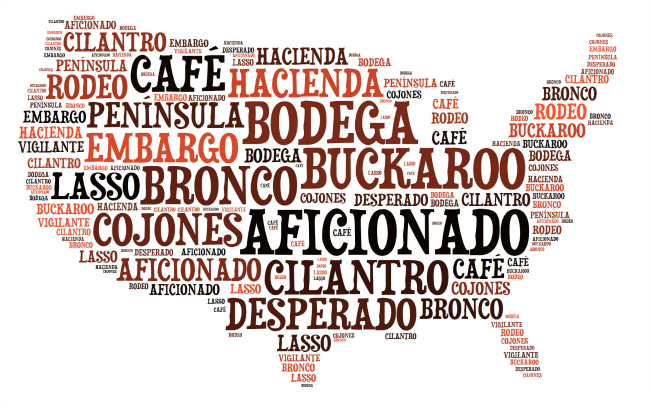10 palabras procedentes del español que usas en inglés / 10 Spanish Words You Might Not Know You’re Using

Probablemente el inglés sea el idioma que más palabras y términos ha exportado a otras lenguas, sin embargo el proceso inverso también se produce. Especialmente destacable es la influencia del español en el inglés de los Estados Unidos. Tanto por motivos históricos como por la creciente comunidad hispanohablante en Estados Unidos, es inevitable que ambas lenguas tomen prestadas palabras y expresiones la una de la otra. Veamos algunas de las más comunes:
-Aficionado. Significa exactamente lo mismo que en español. En Nueva York podrás encontrar a un gran número de wine aficionados.
-Bodega. Esta palabra la oirás principalmente en Nueva York y tiene un significado ligeramente diferente ya que se refiere a una tienda de comestibles de barrio. En el resto del país no la han adoptado y se utiliza la acepción inglesa corner store.
-Buckaroo. El origen de esta curiosa palabra que se usa como sinónimo de cowboy está en la errónea pronunciación de vaquero. Aunque no se utiliza demasiado, se puede ver empleada en algunas películas y novelas.
-Cilantro. Cada vez se utiliza más el término en español para referirse a una de las especias más utilizadas en la comida norteamericana, aunque el inglés tiene el término coriander.
-Cojones. En inglés se utilizan los castizos cojones en su acepción de valor o coraje, desprovista del matiz soez que puede tener en español. Curiosamente esta palabra está especialmente valorada en el mundo político estadounidense.
-Desperado. Un desperado es para los americanos un criminal temerario y audaz que proliferaba mucho durante los primeros años del salvaje oeste americano. Su origen está en la palabra española desesperado.
-Lasso. En Estados Unidos es una cuerda larga de cuero u otro material con un nudo corredizo en un extremo, utilizado para amarrar caballos, ganado, etc. y viene de la española lazo.
-Mano a mano. Esta expresión española se utiliza en inglés para referirse a una “confrontación directa o un duelo entre dos partes”.
-Rodeo. El deporte favorito de los tejanos debe su nombre a que en las colonias españolas de América el rodeo fue el proceso utilizado por los vaqueros para reunir el ganado.
-Vigilante. En Estados Unidos un vigilante es cualquiera que se tome la ley por su mano para vengar algún crimen anterior.
Hay muchas más palabras y expresiones del español que han encontrado acomodo en el inglés. ¿Se os ocurre alguna más?
Without a doubt, English is the language that most words and terms has exported to other languages, but it’s a 2-way street and English speakers also use words imported from other languages. Especially noteworthy is the influence of the Spanish in the US English. The reasons for that are several: the presence of Spaniards during past centuries left an undeniable legacy, but also the growing of the Latin community in the United States is having a deep impact on the way people talk. It is inevitable that both languages borrow words and expressions from each other. Here are some of the most common Spanish words English speakers might not know they’re using:
– Aficionado. It means exactly the same thing in Spanish. In New York you can find a large amount of wine aficionados, for example.
-Bodega. You will hear this word mostly in New York and has a slightly different meaning from the Spanish word since it’s referred to a grocery store and not only to a liquor store. In the rest of the US bodega has not been adopted.
-Buckaroo. The origin of this funny word -used as a synonym for cowboy of de Great Basin and California Region- is in the wrong pronunciation of the Spanish word vaquero.
-Cilantro. This a interesting case. Although English has its own word for this herb (coriander), the use of the Spanish word cilantro is becoming more and more popular.
-Cojones. This powerful and sometimes rude Spanish word is used in English in the sense of value or courage. Interestingly this word is particularly popular in the American political world.
-Desperado. This word was the name given to these audacious criminals who proliferated greatly during the early years of the American Wild West. Its true origin is in the Spanish word desesperado which means desperate.
-Lasso. This is the word used in US to define a long string of leather or other material with a noose at one end, used mainly to tie horses , cattle, etc… You can find its true origin in the Spanish word lazo, meaning tie.
– Mano a mano. This Spanish phrase is used in English to refer to a «direct confrontation or a duel between two parties.» Its literal translation is “hand to hand”.
– Rodeo. The favorite sport of Texans owes its name to the Spanish colonies in America. The rodeo was the process used by cowboys to herd the cattle.
-Vigilante. In the United States a vigilante is anyone who takes the law into his own hands and fights against the crime. In Spanish vigilante means watchman.
There are many more Spanish words and expressions you can find in the English language. Can you think of any more?
Entradas relacionadas
Etiquetas
Español Estados Unidos Idiomas inglés Lengua Española Nueva York
You have brought up a very good details , thankyou for the post.